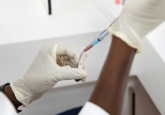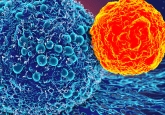Making the case for EGFR TKI sequencing in EGFR mutation-positive NSCLC: a GioTag study US patient analysis

This article reports a subgroup analysis of patients from the GioTag study and aims to provide additional insights into the outcomes associated with sequential afatinib–osimertinib treatment in US clinical practice. The authors found that in patients with EGFR mutation-positive non-small-cell lung cancer, treatment with sequential afatinib–osimertinib improved overall survival. Out of 129 patients from the US, the median time-to-treatment failure was 28.4 months in US patients treated with sequential afatinib–osimertinib. Encouraging time to treatment failure was also observed across a broad range of subgroups, including those with Del19-positive disease and ECOG PS 0/1 performance status. The results of this subgroup analysis provide evidence for the feasibility of sequential afatinib and osimertinib for patients in the US with EGFR mutation-positive NSCLC not initially presenting with de novo brain metastases or EGFR T790M-mutated disease.
The latest research article published in Future Oncology reports a US patient analysis of the GioTag Study.
Abstract:
Aim: To assess time-to-treatment failure (TTF) in US patients with epidermal growth factor receptor mutation-positive (EGFRm+) non-small-cell lung cancer (NSCLC) who received sequential afatinib–osimertinib treatment in the global, observational GioTag study.
Patients and Methods: Patients had EGFR T790M mutation-positive disease after first-line afatinib and subsequently received osimertinib. The primary outcome was TTF. Results: In 129 patients at US centers, median TTF was 28.4 months (90% confidence interval [CI]: 27.0–34.1). Median overall survival was 47.6 months (90% CI: 35.5–51.5).
Conclusion: Sequential afatinib–osimertinib in this US-treated population was associated with long median TTF and represents an effective, evidence-based treatment option for US patients with EGFRm+ NSCLC not presenting with active brain metastases or de novo T790M.
This content is part of our Publication In Focus on GioTag – view more content from this feature by clicking here.






